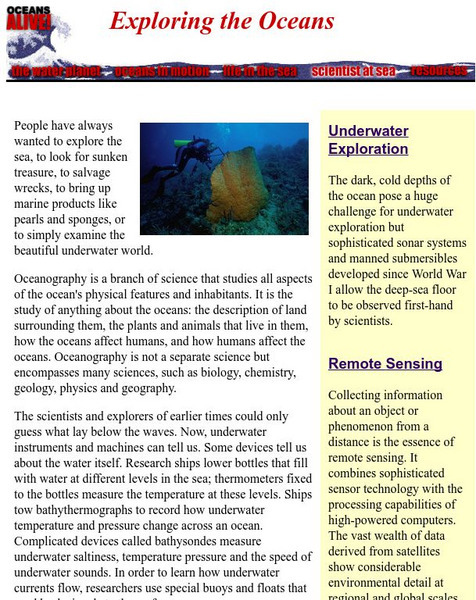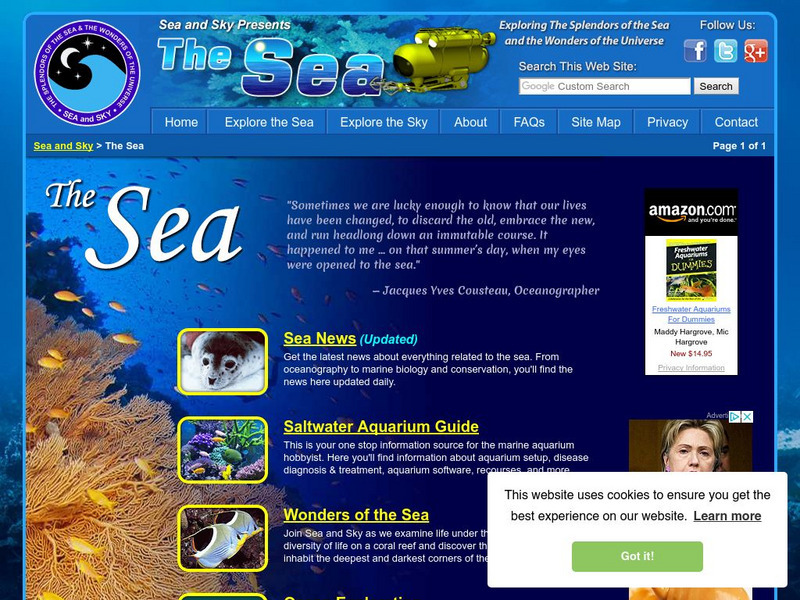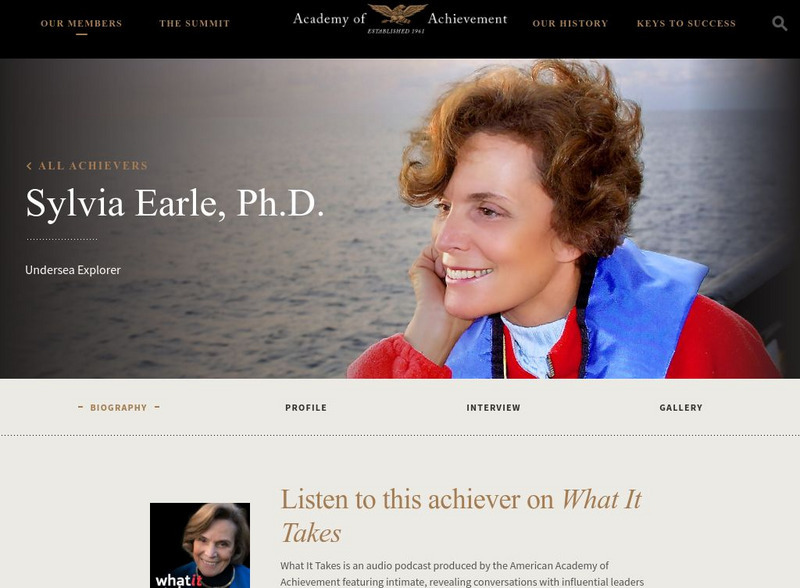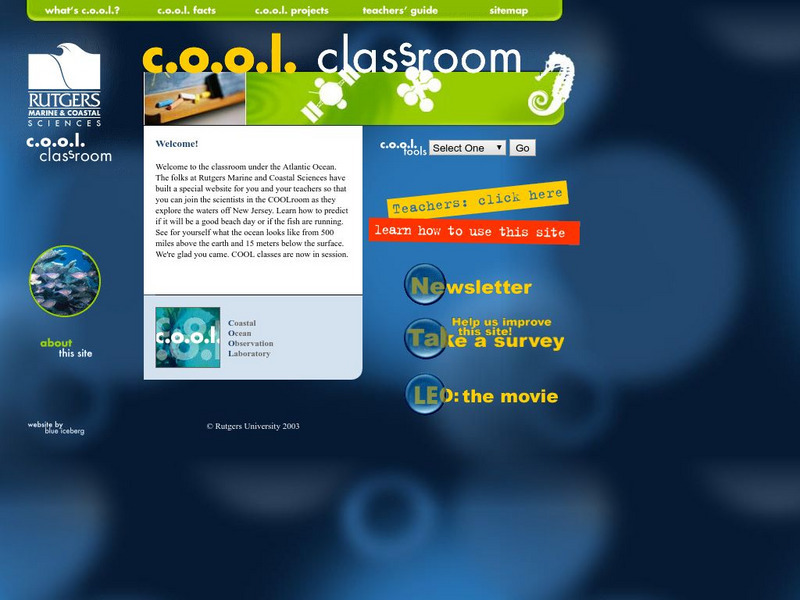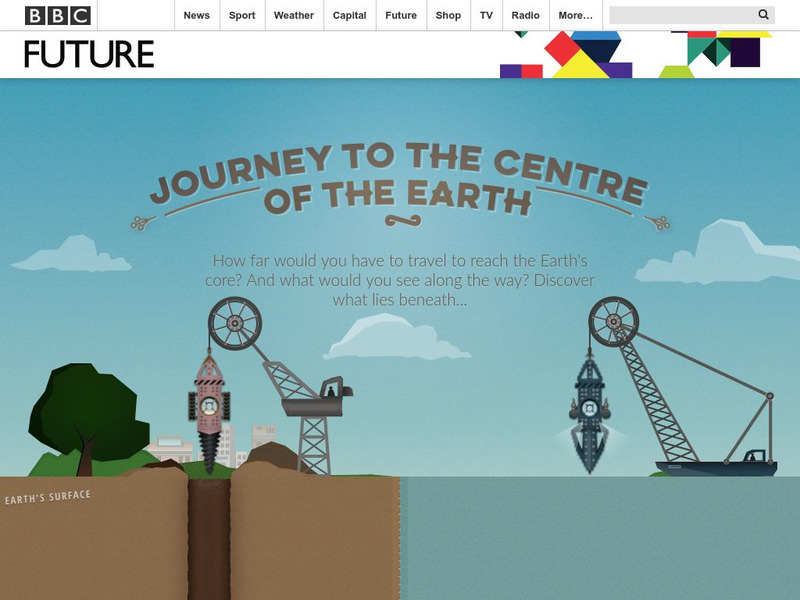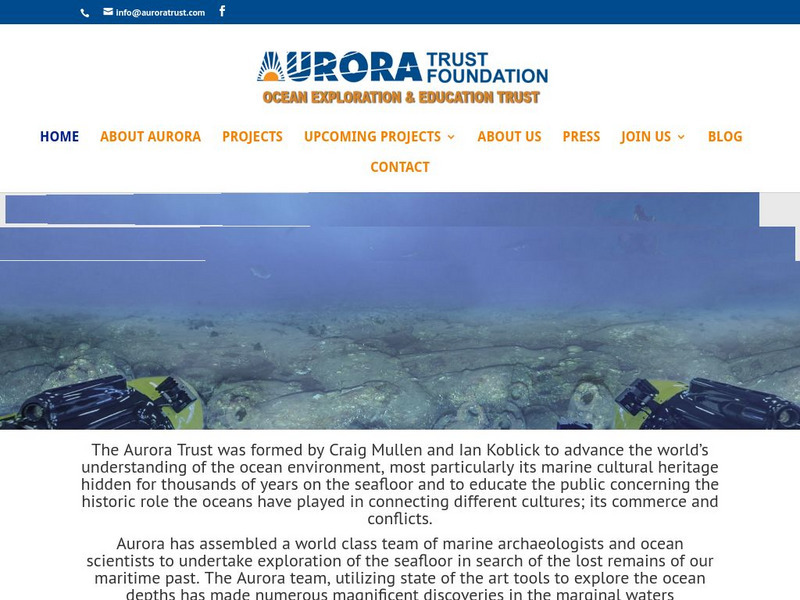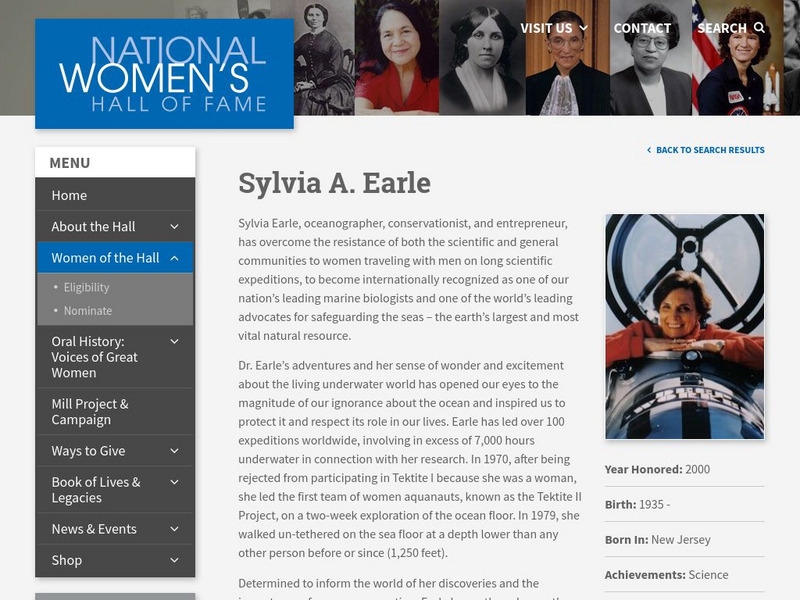Woods Hole Oceanographic Institution
Woods Hole Oceanography Institute: History of Oceanography
An interactive timeline will guide you through the history of oceanography. The timeline stretches from 30,000 BCE to the present.
Woods Hole Oceanographic Institution
Woods Hole Oceanography Institute: Deep Sea Biology
What organisms can survive depths of 2,000 meters or more? Explore the strange creatures that occupy these depths. View a slideshow of deep-sea animals. This site also has a detailed diagram showing the biozones of the ocean.
Museum of Science
Museum of Science: Exploring the Oceans
How do scientists collect information from the dark, cold depths of the ocean? Learn how scientists approach the problems of underwater exploration using remote sensing.
Other
Sea Sky: Explore the Sea
Climb aboard this submarine and explore the sea. This site has pictures and information about the oceans, coral reefs, as well as famous explorers of the deep. You can also play interactive games.
NOAA
Noaa: Submersibles
Learn more about the technology that's involved in oceanography. This resource contains descriptions and pictures of thirteen different submersibles and remotely operated vehicles.
American Academy of Achievement
Academy of Achievement: Sylvia Earle, ph.d.
Site provides biographical information on scientist, Earle, Earle. This article talks about her childhood, education, and work "in the forefront of deep ocean exploration."
Smithsonian Institution
National Museum of Natural History: Ocean Planet
Detailed website that was a companion to a 1995 traveling exhibit of the Smithsonian. Links to lesson plans and other educational materials are at the bottom of the page. Enter the exhibition to explore the world of the ocean.
National Geographic
National Geographic: Geostories: Voyages Across the Ocean
Use this GeoStory in formal or informal instruction to provide information about the voyages of numerous historical navigators and explorers. This GeoStory helps students understand the importance of ocean exploration in contributing to...
PBS
Pbs Teachers: Ocean Careers Exploration
Investigate careers in oceanography and marine exploration. Create a report on the life, education and career of a member of the Ocean Adventures Expedition team and present it in a creative way.
Florida State University
Florida State University: Department of Oceanography
Explore and study the world of Oceanography at Florida State University
Boise State University
Boise State University: Ocean Exploration: Abyssopelagic (Abyssal) Zone
Learn about the very cold, dark region of the ocean known as the abyss. Includes information on the origin of the name of this ocean zone, as well as information on its depth and animal life.
Other
Rutgers Marine & Coastal Sciences: Cool Classroom
Students and teachers can explore the work of marine scientists and observe the ocean from their computers. Learn about Rutgers Coastal Ocean Observation Laboratory, discover why oceanography is important, and see what life is like in...
National Geographic
National Geographic: Geostories: Ocean Exploration
This Geostory illustrates pivotal events in undersea understanding.
Woods Hole Oceanographic Institution
Woods Hole Oceanography Institute: The New England Seamounts
What is a seamount? Why are they found in long chains on the bottom of the ocean? Find answers to these questions as you explore a chain of seamounts located on the bottom of the Atlantic Ocean.
Woods Hole Oceanographic Institution
Woods Hole Oceanography Institute: Hydrothermal Vents
Explore actual photographs of the organisms and geologic structures of an oceanic hydrothermal vent. Additional links provide information about many of the physical properties of this extreme environment.
American Academy of Achievement
Academy of Achievement: Robert D. Ballard, ph.d.
Biography of Robert Ballard, a trained marine geologist who is famous for discovering the Titanic as well as his work in oceanic research. Today, he is resident of the Institute for Exploration in Mystic, Connecticut; Scientist Emeritus...
BBC
Bbc Future: Journey to the Centre of the Earth
Explore deep underground and deep in the ocean to discover what lies beneath the surface. Don't stop until the final destination: the core of the Earth.
Texas A&M University
Ocean World: Bringing the Ocean to the Classroom
Online resource for students and teachers to see information on icebergs, fisheries, coral reefs, waves, currents and more. Provides teachers with learning activities. Has its own ask-an-expert site (Ask Dr. Bob), and provides real-time...
Other
Geotimes: Off the Beaten Path
Get a glimpse inside the careers of geoscience professionals. Explore the types of career experiences that are available in the geoscience field.
Other
Aurora Trust and Aurora Institute of Maritime Studies
Find out about human interaction with the world's oceans through education support activities in the fields of ocean exploration, research, and education.
Science Education Resource Center at Carleton College
Serc: Dive and Discover: Expeditions to the Seafloor
Dive and Discover immerses you into the world of ocean exploration. Through stories, photos, and videos go on board research expeditions that use deep-sea tools and vehicles, and become part of teams of researchers making new discoveries.
PBS
Pbs Teachers: Predator Protector Game Lesson
Describe the habitat, food web and ecosystem of shark species. Identify threats to sharks and explore how top predators help to maintain the balance of nature within ecosystems. This lesson plan also contains an interactive game.
The Franklin Institute
In Quiry Almanack: Undersea and Oversee
Dive into a greater understanding of the oceans by tagging along on this exploration of the oceans.
National Women's Hall of Fame
National Women's Hall of Fame: Sylvia Earle
Inducted into the Women's Hall of Fame in 2000, Sylvia Earle is an internationally recognized marine biologist, author, and oceanographer. Here you can read about her most adventurous and fascinating life.




